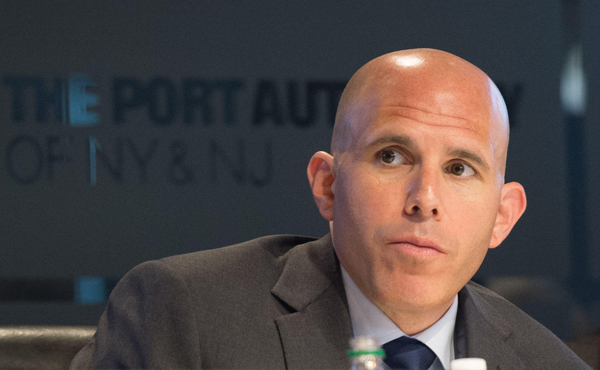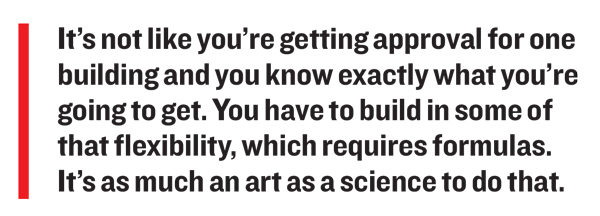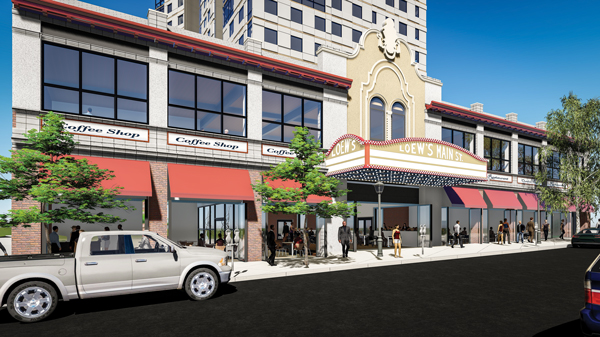Trending
Masters of New Rochelle
RXR’s CEO Scott Rechler takes TRD behind the scenes on the firm’s winning bid to redevelop 10 million square feet downtown

The redevelopment of New Rochelle is a success story in the making for Westchester County.
Three years ago, New Rochelle’s City Council selected RXR Realty, along with Renaissance Downtowns, as the “master developer” for the city’s $4 billion downtown revitalization of more than 10 million square feet of space. A year later, the city unanimously approved a zoning plan streamlining the development process for all firms involved.
RXR is in the midst of building its first two projects as part of the master plan. The first is the $120 million mixed-use building at 587 Main Street, which is already up to 18 stories out of 28 and expects to start leasing within a year. Then RXR will start the next project, a $300 million two-tower development on a former parking garage.
New Rochelle had false starts before choosing RXR, said the company’s CEO, Scott Rechler. After other developers had tried but not followed through with plans, some in the city were distrustful. Rechler said that building consensus for the plan through listening tours and other means went a long way toward assuaging the community’s worries.
RXR is perhaps best known for high-profile office properties in Manhattan, including the Starrett-Lehigh Building and the Helmsley Building. But as part of its big bet on the suburbs, the company is emerging as one of the largest developers in Westchester. RXR has multiple multifamily projects in the county and is in the running for several others.
Since he started with the company in 2007, Rechler has helped RXR increase its portfolio to 23.7 million square feet of commercial operating properties and approximately 6,000 multifamily and for-sale units in the area. Gov. Andrew Cuomo, a longtime ally, has appointed him to several boards, including the board of the Metropolitan Transportation Authority in June.
Some say Rechler has become increasingly political himself as of late, with pointed tweets and appearances at events. But Rechler thinks that’s just good business: “I do believe that it is particularly incumbent upon business leaders to get involved in those issues that directly impact the vitality of our communities.”
The Real Deal spoke with Rechler in December about RXR’s plans and what’s up next for the developer.
Three years ago, RXR, along with Renaissance Downtowns, was named “master developer” of downtown New Rochelle. To be tasked with that is a big responsibility. How did you view the project going into it? For New York City to be successful, you need to look through a regional lens. And places like New Rochelle, these historic downtowns that in their heyday were the heart of their community, but over time have had economic challenges, are really the solution to doing that. You have cities with a lot of excess parking facilities and municipal land, and what they really need are economic generators.

So when we worked with the city of New Rochelle, it was approached as a public-private partnership, where it would be a win for the city and a win for the region. It’s a model we’re following throughout the region. We have 6,000 types of [multifamily] units being built in the New York metro region now. But New Rochelle was best situated and best executed by the mayor and the City Council.
Why do you think RXR was chosen for the project? What makes your company different from the competition? We’re not in it to make a quick buck, but to be here and see the vision through. New Rochelle and other communities have had false starts, or were sold megaconcepts and the developments never moved forward.
We approached it in a way that gave them confidence — an approach that could move forward— and the expertise and alignment that could get it done.
Within one year you were able to get unanimous approval of your plan by the City Council, including rezoning more than 250 acres. How did you get the buy-in from everyone so quickly? We did what I’ll call a ground game. We made sure we understood what the community envisioned for themselves versus dictating to the community what we envisioned. By doing that, it became a plan we all owned together versus us presenting a plan. Spending the time building that consensus — going on listening tours and understanding how people viewed New Rochelle today and what the New Rochelle of tomorrow ought to be — gave us a much smoother process to navigate through. The leadership of New Rochelle was very organized and did a great job of running an effective process and was also very communicative to all of the stakeholders.
The city approved a modified review process for buildings that are a part of the master plan, with simplified zoning codes and generic environmental reviews, to enable downtown developers to begin their projects within 90 days. Can you explain that? We ended up negotiating a framework on the zoning that provides for flexibility, so as the economic market changes, the zoning can change alongside it. Whether it was for multifamily, office or other uses, there’s flexibility built in. There’s a process put in place that provides us and other developers certainty in terms of knowing you can begin a process and get it completed in a certain time frame. And those are key things when you decide you’re moving forward.
The other thing is, as master developer, we got the right to develop the land that’s owned by the municipality. Of the [more than] 10 million square feet that was rezoned in the master plan, that’s about 3.5 to 4 million square feet. For the balance, the theory is that other developers can use the same zoning to also build. So we’re not relying just on RXR to help revitalize and redevelop downtown New Rochelle. We actually are encouraging other interested developers to participate in this process and take on other projects. And our view is with each incremental project, it furthers the vision of bringing New Rochelle to the next level.
Do you have any say on other developers’ proposals? The city makes the determination, but it has to be consistent with the master development plan.
What were some of the challenges you had to overcome to get the plan together and have it approved so quickly? It was a very intense process. The challenges were taking the conceptual understanding and finding ways to document it effectively and consistently. But also building something that provided flexibility to be dynamic and responsive to what happens in the market overall. It’s not like you’re getting approval for one building and you know exactly what you’re going to get. You have to build in some of that flexibility, which requires formulas. It’s as much an art as a science to do that.
To put the intensity in perspective, a smaller project in Glen Cove, Long Island, took us 11 years to get to the point where we are in New Rochelle. So, 11 years versus 11 months. Big difference.

As part of the New Rochelle project, RXR is restoring the old Loew’s Theater on Main Street to create a community space.
What were some of the snags in Glen Cove that you didn’t have to worry about with New Rochelle? The Glen Cove project went through multiple rounds of leadership. We’re now, for example, on our fourth mayor of Glen Cove, maybe fifth mayor because they lost the election by one vote. So it’s a lesson to all of us to make sure you go out and vote. But these are the challenges: change in leadership and not having the continuity. Everyone that came in wanted their fingerprints on what it looked like.
Also, I don’t think when we initially began they had as much community buy-in as New Rochelle had. Part of what helped us with New Rochelle was they went through megadevelopment plans that never got done, so they already had lived through those processes and learned from that and were determined to get it done and get it right in a way that was aligned with the city itself.
Even the fact that they chose a master developer — that was what the RFP was for, to choose the team — because they believed it was the team that would have consistent values and have the capacity to get it done. They didn’t necessarily choose a project. It was the leadership.
When do you plan to start leasing up at 587 Main Street, the first project in the master plan? On 587 Main, I would say within a year. We’re creating a type of housing that would appeal to people who might live in Manhattan or Long Island City or Brooklyn. Urban-type living, fully amenitized like you’d have in those types of markets with the health clubs, yoga studios, concierge services, lounges, private dining rooms, kitchens, outdoor space — all the things you’d expect to see in a luxury type of building in those markets, but at 30 to 50 percent less cost. And it’s still the same 30-minute ride to Midtown Manhattan, since you’d have to take a subway from those other markets.
What details can you tell us about the units, what are they going to look like? They’ll look very similar to urban city-type apartments, larger in size than some of the ones you would get in the city. Very high-quality finishing, very good views.
Who are your target renters? If you look at Westchester, there’s a lot of young professionals and maturing families that are moving out of [the county]. The young professionals, when they’re looking for a different quality of life, this is meant to try to keep them there and retain them. The maturing families, as they become empty nesters, this is an alternative for them as a place to live. [There also are] people who come to the New York region and are looking for alternatives for urban living that’s more reasonably priced with good connectivity back to Manhattan.
Both 587 Main and the next project in the works, the two 28-story towers at Church and Division, include retail space. They have about 20,000 and 40,000 square feet of retail, respectively. With challenges in that sector, what will the tenant mix look like? You want to try to have lifestyle-type retail so the
people in the building and other pedestrians that are in downtown can be supported by it, and you also want to complement the other uses in downtown. We’re looking at eateries, wine shops, gourmet markets — things of that nature. More experiential-type retail is the objective.
RXR was awarded height bonuses for providing community benefits. What are some of the ones that you’re providing with the two projects currently under development? In this instance, we’re restoring a historic theater and making it a community space, the old Loew’s
Main Street theater. This will be a community space that will be available for the city at large. And the second, I’m not sure we’ve determined what that’s going to be yet.
Your company’s motto is “Doing good and doing well at the same time.” How do the New Rochelle projects fulfill that motto? At the same time that we’re out developing these projects, we’re actually stimulating the economic engine for New Rochelle. We’re bringing new people into downtown that are going to shop in their stores, go to their restaurants, increase the real estate tax revenue and create a sense of vibrancy and energy in downtown New Rochelle and enhance the streetscape. The whole premise behind this model is that the development is on a parallel path, being an economic accelerator for the city as well as providing the housing for the region.
Why New Rochelle? As previously mentioned, the city fell on hard times, and some people might have negative impressions of the area. What are the biggest risks you are taking with development in the city? And how do you plan to mitigate them? Of the projects that we’re working on, New Rochelle is probably the most proven market. They already have strong multifamily and good municipal leadership, which is critical in being successful. The transit system is one of the better ones in the region; that’s a key factor.
But it’s going to require a lot of building and a new supply. So for us it’s making sure we’re monitoring the absorption of the supply that we’re putting in — and other developers that are building in New Rochelle — to make sure that it can be absorbed effectively and that we pace ourselves appropriately.
We’ve heard that construction lending for multifamily in Westchester County has begun to cool. How will that impact the plans for New Rochelle? Sourcing in construction financing is more challenging around the region. We tend to use relatively low leverage, so that helps because we invest a lot of equity in the projects, and we have a strong reputation and relationships with banks. I would say that’s one of our competitive advantages when pursuing these types of projects.
But do you know how that might impact other developers to help build out that larger footprint for downtown? I think over the long term, as projects are built and are successful, they’ll validate the model, and I think that you’ll have lenders who will look at those comparison developments and get comfort from that.
What can you tell us about RXR’s role as a lender? We’ve done a lot of lending. Right now we probably have $600 to $700 million out of lending, and so it’s something we’re constantly looking at. And we have a pipeline of close to $1 billion worth of potential loans that we’re reviewing right now. Most of that is transition loans, transitioning assets or construction loans, underleveraged buildings that need more debt on them or where the owners would like more debt.
What’s next for RXR in New Rochelle? We’re continually looking at all the different sites that we have available for future development and being creative in terms of where there should be retail, what other uses should be there and doing the predevelopment work so if there’s an opportunity to move more quickly, we’re ready to move quickly.
So you could be doing a third project? Correct. We’re having discussions on third and fourth sites. We’re looking at multiple sites at the same time.
What about in other areas of Westchester? There was a request for quotation for a master planner for Port Chester. We’re actually in the process; we responded to that RFQ. We responded to an RFP in White Plains. So we’re bullish on the downtown markets in Westchester. And where there’s opportunity, where leadership is looking to find a good private-sector partner, we’re engaged in all cases in those circumstances.
—This interview was edited for length
and clarity.




